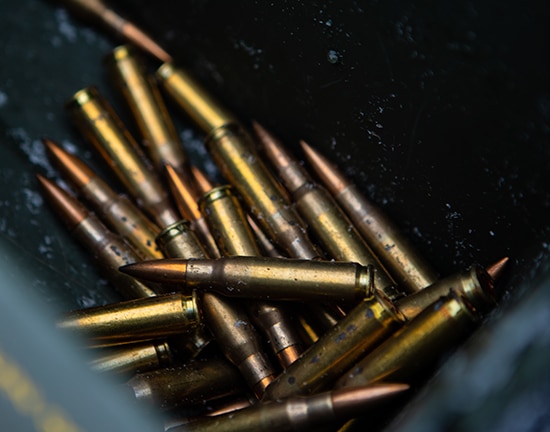Options on What to Do with Old Ammunition
At some point, you may find yourself needing to dispose of ammunition. Whether you have unused ammo or expired rounds, it’s important to handle the disposal process correctly and responsibly. Not only does this ensure safety, but it also helps protect the environment.
Ammunition comprises various components, including bullets, casings, gunpowder, and primers. Unused ammunition can often be recycled by disassembling it into its parts. Metal components can be recycled, while gunpowder can be repurposed as fertilizer.
When it comes to used ammunition, the primary recyclable component is the brass casing. Recycling these casings helps reduce waste and conserves resources.
Table of contents
- Options on What to Do with Old Ammunition
- Can Ammunition Be Recycled?
- Where to Take Ammunition for Disposal
- What Not to Do with Ammunition
- How to Properly Dispose of Unused Ammunition
- Disposing of Ammunition: Professional Assistance
- Disposing of Ammunition: Recycling Options
- Disposing of Ammunition: Range and Gun Store Options
- Conclusion: How to Properly Dispose of Ammo
- FAQs: How to Properly Dispose of Ammo
Can Ammunition Be Recycled?
When it comes to ammunition disposal, recycling is a topic of interest. While the availability of recycling options for unused ammunition is limited, there are some options. Bullet Pullers offer a solution for disassembling casing, bullets, and powder. Not all pullers remove the primer, so if that is your intention, be sure the one you purchase does.

Used ammunition, on the other hand, is primarily recycled through the reuse of brass casings. This practice involves melting down the casings to manufacture new ammunition. By recycling the brass casings, we can reduce the demand for new materials and minimize environmental impact.
It is important to follow proper ammo disposal guidelines to promote recycling.
and minimize the environmental impact of ammunition. By doing so, we can contribute to a more sustainable and responsible approach to ammunition disposal.
The Benefits of Ammunition Recycling
Recycling ammunition offers several benefits. Firstly, it helps reduce the environmental impact of ammunition by diverting it from landfills and incineration. By recycling the metal components and reusing gunpowder, we can minimize pollution and conserve valuable resources.
“Recycling ammunition is not only beneficial for the environment but also helps conserve valuable resources. By recycling brass casings and reusing gunpowder, we reduce the need for raw materials and energy-intensive manufacturing processes.”

Additionally, ammunition recycling contributes to the circular economy by closing the loop on the lifecycle of ammunition. Rather than disposing of ammunition as waste, we can transform it into new products, reducing the overall demand for raw materials and energy-intensive manufacturing processes.
Where to Take Ammunition for Disposal
If you have unwanted ammunition, there are several responsible disposal methods available. Here are some options to consider:
- Contact your local police station: Many police departments accept small quantities of ammunition for disposal. Contact your local station to inquire about their specific guidelines and drop-off procedures.
- Check hazardous waste drop-off locations: Your city or county may have designated hazardous waste drop-off locations where you can safely dispose of ammunition. These facilities may also hold collection events throughout the year, providing convenient opportunities for disposal.
- Reach out to local gun ranges: Some gun ranges accept dud rounds, which can be appropriately disposed of. Check with your local range to see if they offer this service.
Remember, it is essential to follow proper ammunition disposal methods to ensure the safety of others and protect the environment. By taking advantage of these available options, you can contribute to responsible ammunition disposal.
Additional Considerations
When taking ammunition for disposal, it is crucial to ensure it is securely packaged. This helps prevent accidents and protects those handling the ammunition. Consider the following:
- Place each round in a separate, durable container to prevent any potential friction or impact.
- Avoid overfilling containers and ensure they are sealed tightly.
- Label the containers clearly to indicate that they contain ammunition for disposal.
These additional considerations help maintain a safe and efficient disposal process.
Table: Comparison of Ammunition Disposal Methods
| Disposal Method | Advantages | Considerations |
|---|---|---|
| Contacting local police station | – Convenience – Accepted in small quantities | – Check specific guidelines – May not accept large quantities |
| Using hazardous waste drop-off locations | – Proper disposal facilities – Collection events | – Verify availability in your area – Timing of collection events |
| Utilizing local gun ranges | – Dispose of dud rounds – Specialist knowledge | – Availability varies by range – Confirm acceptance |
These methods differ in their advantages and considerations. Consider your specific needs and choose the option that best suits your situation.
What Not to Do with Ammunition
Regarding ammunition disposal, specific actions should be avoided to ensure safe and proper handling. Here are some key guidelines on what not to do with ammunition:
Don’t Bury Ammunition
Burying ammunition may seem like a convenient way to dispose of it, but it can have detrimental effects on the environment. The lead from bullets can leach into the soil and contaminate groundwater, posing a risk to both human health and wildlife. Therefore, it is important to avoid burying ammunition.
Refrain from Throwing Ammunition in the Trash
Throwing ammunition in the trash is not a safe disposal method. Ammunition can be hazardous when compacted in garbage trucks and potentially explode under certain conditions. Additionally, improper disposal can lead to ammunition ending up in landfills, which can have long-lasting negative environmental effects.
Avoid Soaking Ammunition in Water or Oil
Soaking ammunition in water or oil and throwing it away is not a safe or responsible disposal method. Water or oil can corrode the ammunition, making it unstable and potentially dangerous. Instead, it is important to follow proper guidelines for ammunition disposal to ensure the safety of others and the environment.
By avoiding these actions and following proper ammunition disposal guidelines, we can contribute to the safe and responsible handling of unwanted ammunition, protecting both our communities and the environment.
How to Properly Dispose of Unused Ammunition
Regarding responsible ammunition disposal, it is crucial to know the proper methods for disposing of unused ammunition. This includes expired or corroded rounds, as well as spent shell casings. Leaving these items in the environment can have harmful consequences, so it is important to take appropriate action.
One option for disposing of unused ammunition is to contact your local law enforcement agency. They can guide proper disposal methods and may even offer to pick up the unwanted ammunition. Alternatively, you can take the ammunition to designated hazardous waste drop-off locations. These facilities are equipped to handle ammunition safely and ensure its proper disposal.
Recycling ammunition is another responsible option. Some reloaders may be interested in reusing or recycling the ammunition components. However, it is important to check local laws and regulations regarding ammunition recycling to ensure compliance and proper disposal.

Summary:
- Contact your local law enforcement agency or utilize hazardous waste drop-off locations for safe ammunition disposal.
- Consider recycling options by contacting reloaders or individuals interested in reusing ammunition components.
- Always check local laws and regulations to ensure compliance with ammunition disposal guidelines.
| Proper Ammo Disposal Methods | Recycling Options |
|---|---|
| Contact local law enforcement or use hazardous waste drop-off locations. | Reach out to reloaders or individuals interested in reusing ammunition components. |
| Ensure compliance with ammunition disposal guidelines. | Check local laws and regulations for ammunition recycling. |
Disposing of Ammunition: Professional Assistance
Regarding responsible ammunition disposal, seeking professional assistance is highly recommended. Professionals can guide the proper disposal methods and ensure it is done safely and responsibly. One of the primary sources of professional assistance for ammunition disposal is local law enforcement agencies. They are well-versed in the regulations and guidelines surrounding ammunition disposal and can offer valuable advice.
In many cases, local law enforcement agencies may even provide collection services where they will come to your location and pick up any unwanted ammunition. This eliminates the need to transport the ammunition and ensures that it is handled correctly from start to finish.
Disposing of Ammunition: Recycling Options
When it comes to responsible ammunition disposal, recycling can be an excellent option. Not only does it help reduce waste, but it also contributes to the conservation of valuable resources. Home reloaders, in particular, can play a significant role in recycling ammunition by disassembling dud rounds and reusing the components.

One effective method for disassembling ammunition is using a kinetic puller. This tool allows you to separate the bullet, casing, gunpowder, and primer efficiently. Once disassembled, the metal components, such as brass casings, can be recycled. Some reloaders may even be interested in reusing or recycling the gunpowder.
Before recycling ammunition, you must check the local laws and regulations governing ammunition recycling in your area. This ensures compliance and proper disposal. Additionally, it is important to handle ammunition carefully and follow all safety precautions, as even unused rounds can be hazardous if mishandled.
Recycling Ammunition: Key Points
- Disassembling dud rounds can allow for the recycling of metal components.
- Kinetic pullers are a helpful tool for safely separating ammunition components.
- Check local laws and regulations to ensure compliance with ammunition recycling guidelines.
Disposing of Ammunition: Range and Gun Store Options
Regarding disposing of ammunition, gun ranges, and gun stores can provide valuable options for responsible and safe disposal. These establishments often handle large quantities of ammunition and have established protocols.

Gun ranges typically have designated containers for dud rounds and may arrange regular collections with local law enforcement or recycling companies. Additionally, some gun stores may accept unwanted ammunition for proper disposal. If you have expired or unused rounds, contacting your local gun range or store can help you find the best solution.
It is important to contact your local range or store to inquire about their specific policies and procedures for ammunition disposal. They will be able to provide you with detailed information on how to relinquish your unwanted ammunition safely. By utilizing these range and gun store options, you can contribute to responsible and eco-friendly ammunition disposal practices.
Conclusion: How to Properly Dispose of Ammo
Proper ammo disposal is the responsibility of all gun owners. Whether you have unused or used ammunition, it’s important to follow the correct guidelines to ensure proper disposal. Unused ammunition can be recycled by disassembling it into its component parts, while used ammunition is

primarily recycled through the reuse of brass casings.
To dispose of ammunition correctly, you have several options. Contact your local law enforcement to inquire if they accept ammunition, or check with your city or county hazardous waste drop-off location.
Key Takeaways:
- Properly disposing of ammunition is essential for safety and environmental responsibility.
- Unused ammunition can often be recycled by disassembling it into its parts.
- Used ammunition is primarily recycled through the reuse of brass casings.
- It’s important to know where to take ammunition for proper disposal to ensure safety and environmental responsibility.
- Contact local law enforcement, hazardous waste drop-off locations, or gun ranges for ammunition disposal options.
FAQs: How to Properly Dispose of Ammo
Yes, unused ammunition can potentially be recycled by disassembling it into its component parts.
You can contact your local police station to see if they accept ammunition. If not, check with your city or county hazardous waste drop-off location or local gun ranges.
Avoid burying ammunition, throwing it in the trash, or soaking it in water or oil. Follow proper disposal guidelines to ensure safety and environmental responsibility.
Proper ammo disposal maintains safety, prevents accidental firing, and minimizes environmental impact by reducing pollution and promoting recycling.
Outdoor enthusiasts should prioritize responsible disposal by contacting local law enforcement or utilizing hazardous waste drop-off locations.
Contact local authorities or gun stores to inquire about their disposal policies. Consider recycling options or consulting with professionals for guidance.



